Gold of Our Fathers - [28]
As they got to Dunkwa, Dawson made one stop to buy an obligatory bottle of schnapps for the chief, whose name was Nana Akrofi. Showing up empty-handed was a no-no. His palace was at the top of an incline along a paved road eaten away at its edges and hugged by worn houses with corrugated tin roofs. At the roadside, an old man in a green shirt dozed off with his back against the wall of a building as he shared space with two other people on that typically Ghanaian item of furniture-the long wooden bench.
The color of the chief’s brick house had been corrupted by accumulated layers of the ocher village dust, but the small veranda where a young man asked Dawson and Obeng to take a seat while he went into the house to get the chief was painted an uneven pink. They could smell palm nut soup cooking from somewhere in the back, and a baby was crying.
When Nana Akrofi emerged, he turned out to be younger than Dawson had imagined. He wasn’t dressed in resplendent traditional garb either, but rather in a pair of tan khaki slacks and an orange T-shirt with rutgers universitywritten on the front in blue.
Akrofi shook hands with them, right to left, and then sat down in a white plastic chair. Times must be hard, Dawson thought, because the chief was without a linguist or spokesman. Or it could be this young guy was the “acting” chief and had dispensed with that old formality. Traditional life was changing.
Neither Dawson nor Obeng spoke out of turn. The chief had to start first, and with a fairly predictable script. After a pause in which he leaned forward slightly, he cleared his throat. “Eh-heh. Who are you?”
Dawson let Obeng speak first on their behalf. In this case, police hierarchy was subordinate to the sergeant’s roots in the Ashanti Region. Speaking in Twi, he introduced himself, beginning with the deferential “Mepa wo kyew,” and then introduced Dawson. Then it was time to present the schnapps, which the chief gracefully accepted.
“So,” he said, “what is your mission here today?”
“Please, Nana,” Obeng continued, “a certain Chinese man died yesterday morning at one of the mines around Dunkwa and my boss here, Chief Inspector Dawson, and I are investigating what happened.”
“Yes, I know about it,” Akrofi said, looking directly at Dawson now. “If I can help you in your investigation, I will.”
“Thank you, Nana,” Dawson said. “The Chinese man’s name is Bao Liu. He was the boss of some galamsey boys who found him buried in the soil yesterday morning. We need to talk to those boys, but they have all disappeared.”
“Are they in trouble?” the chief asked.
“I don’t think so,” Dawson said truthfully, “but without speaking with them, the investigation is incomplete because they are the first witnesses.”
Akrofi appeared satisfied with that and nodded. “I know the one called Kudzo Gablah. He’s from the Volta Region. I understand he left Dunkwa this morning and went to one of the mines at Aniamoa.”
Dawson glanced at Obeng. That was the sergeant’s home village. Connections like that were always good.
“Mepa wo kyew,” Dawson said to the chief, “you say Kudzo went to Aniamoa. Is it because he was trying to avoid the police?”
Akrofi smiled slightly. “I don’t know. Maybe you need to ask him.”
Dawson nodded. “We will do so. Thank you, Nana.”
“You are welcome.”
It might have been the end to a short meeting, but Dawson was curious about other things, and now that he had given the chief his schnapps, he felt licensed to ask Akrofi if he had known Bao Liu or his brother Wei.
“I was not the chief here when Bao first came to Dunkwa three years ago,” Akrofi replied, “but one time they came to pay their respects to me.”
Dawson wondered if they had brought the chief some gold along with the schnapps. “Did you hear of any problems between the Lius and the farmers working in the area of the mine?” he asked.
Akrofi shook his head. “No problems at all.”
But Dawson’s left palm began to itch as if a caterpillar was walking across it, and he knew the chief wasn’t being truthful. “Mepa wo kyew,Nana,” he said, still very deferentially, “if you don’t mind my asking, how have the Chinese people been received in Dunkwa?”
Akrofi reflectively rubbed his hands back and forth over the tops of his thighs.
“Well, you see,” he began, “the China people have helped us a lot. They have provided the youth with employment where before there was no work. You know, these young guys don’t want to work on the farms planting cocoa and all that. They want quick money. Cocoa is too slow. Look at how many years it takes for one cocoa tree to start bearing fruit. So this gold mining, it is very good for our boys. It keeps them out of trouble, prevents them from engaging in robbery and theft and all those things.”
“Medaase, Nana,” Dawson said, nodding to show acknowledgment of and respect for Akrofi’s observations, but in fact he was slowly working up to the most troublesome aspect of the Chinese occupation.
“In addition,” the chief continued, “they constructed two boreholes for us because the Ofin River has been polluted by AngloGold Ashanti mining. So we can now have a good water supply.”
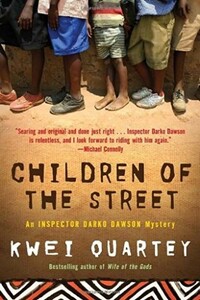
"Searing and original and done just right… Inspector Darko Dawson is relentless, and I look forward to riding with him again." – Michael ConnellyIn the slums of Accra, Ghana's fast-moving, cosmopolitan capital, teenagers are turning up dead. Inspector Darko Dawson has seen many crimes, but this latest string of murders – in which all the young victims bear a chilling signature – is the most unsettling of his career. Are these heinous acts a form of ritual killing or the work of a lone, cold-blooded monster? With time running out, Dawson embarks on a harrowing journey through the city's underbelly and confronts the brutal world of the urban poor, where street children are forced to fight for their very survival – and a cunning killer seems just out of reach.
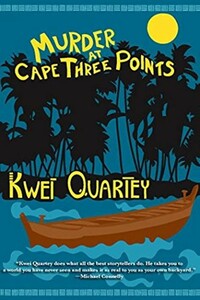
At Cape Three Points on the beautiful Ghanaian coast, a canoe washes up at an oil rig site. The two bodies in the canoe – who turn out to be a prominent, wealthy, middle-aged married couple – have obviously been murdered; the way Mr. Smith-Aidoo has been gruesomely decapitated suggests the killer was trying to send a specific message – but what, and to whom, is a mystery.The Smith-Aidoos, pillars in their community, are mourned by everyone, but especially by their niece Sapphire, a successful pediatric surgeon in Ghana's capital, Accra.
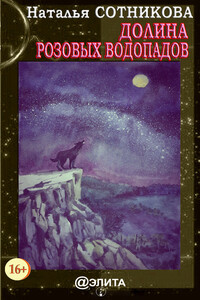
Однажды в руки безработной журналистки Екатерины Голицыной и её друга Николая Артюхова попадает странная флешка с видеозаписью. Известный американский писатель Майкл Доусон просит помочь ему в поисках исчезнувшей жены, Лии, родители которой погибли от рук китайской секты «Чёрное Братство». Следы Лии ведут в Россию.Старая китайская легенда неожиданно оживает в наши дни. Маленький научный городок Техногорск становится центром борьбы добра и зла. Оборотни, карлики, московский вор в законе, всемогущий мэр города и сам Магистр «Черного Братства».Кто может противостоять им? К тому же Николай исчезает самым странным образом.
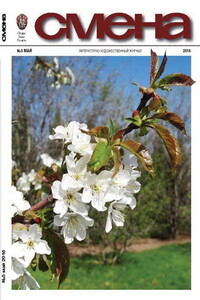
Ирину Александрову в последнее время преследовали одни несчастья: смерть дяди, гибель тети, странные голоса по ночам, толчок в спину под колеса поезда — все эти события были связаны между собой. Но как — ответа не было. А ощущение чего-то страшного, неотвратимого, что должно произойти, нарастало.
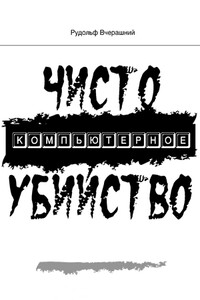
Заместитель командира воинской части в/ч № 755605 — собственно воинской частью был научно-исследовательский институт военно-морского ведомства — капитан первого ранга Гаврилов был обнаружен мертвым в своем рабочем кабинете. Прибывшая опергруппа не обнаружили каких-либо следов, отпечатков и других зацепок. Дело было поручено следователю военной прокуратуры Паламарчуку Василию Аполлинарьевичу.
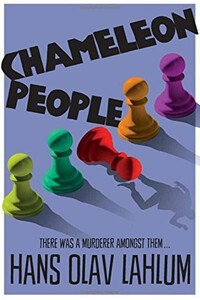
From the international bestselling author, Hans Olav Lahlum, comes Chameleon People, the fourth murder mystery in the K2 and Patricia series.1972. On a cold March morning the weekend peace is broken when a frantic young cyclist rings on Inspector Kolbjorn 'K2' Kristiansen's doorbell, desperate to speak to the detective.Compelled to help, K2 lets the boy inside, only to discover that he is being pursued by K2's colleagues in the Oslo police. A bloody knife is quickly found in the young man's pocket: a knife that matches the stab wounds of a politician murdered just a few streets away.The evidence seems clear-cut, and the arrest couldn't be easier.
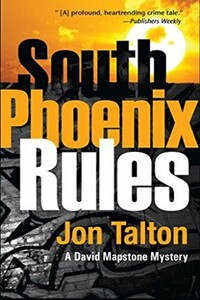
A handsome young New York professor comes to Phoenix to research his new book. But when he's brutally murdered, police connect him to one of the world's most deadly drug cartels. This shouldn't be a case for historian-turned-deputy David Mapstone – except the victim has been dating David's sister-in-law Robin and now she's a target, too. David's wife Lindsey is in Washington with an elite anti-cyber terror unit and she makes one demand of him: protect Robin.This won't be an easy job with the city police suspicious of Robin and trying to pressure her.
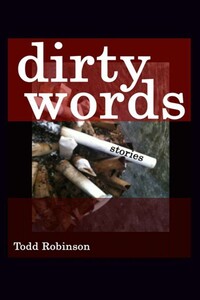
From the creator of the groundbreaking crime-fiction magazine THUGLIT comes…DIRTY WORDS.The first collection from award-winning short story writer, Todd Robinson.Featuring:SO LONG JOHNNIE SCUMBAG – selected for The Year's Best Writing 2003 by Writer's Digest.The Derringer Award nominated short, ROSES AT HIS FEET.THE LONG COUNT – selected as a Notable Story of the Year in Best American Mystery Stories 2005.PLUS eight more tales of in-your-face crime fiction.